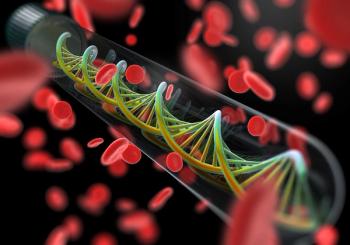
Oral Duvelisib Potential New Option for Indolent Non-Hodgkin Lymphoma
The DYNAMO study investigated the oral PI3K gamma inhibitor duvelisib in heavily pretreated indolent non-Hodgkin lymphoma patients.
The oral PI3K gamma inhibitor duvelisib produced an overall response rate of close to 50% in patients with heavily pretreated, double-refractory, indolent non-Hodgkin lymphoma (NHL) in the phase II DYNAMO study.
Results of the global trial showed that duvelisib may “provide a new oral treatment option for this patient population of which many are elderly and in need of additional therapies,” wrote
Duvelisib is currently approved by the US Food and Drug Administration for relapsed or refractory chronic lymphocytic leukemia or small lymphocytic lymphoma (SLL), as well as follicular lymphoma after two or more prior systemic therapies.
This study in indolent NHL included 129 patients with either follicular lymphoma (42.2%), SLL (67.9%), or marginal zone B-cell lymphoma (38.9%). All patients were refractory to rituximab and chemotherapy or radioimmunotherapy. The treatment in the study consisted of twice-daily 25-mg duvelisib in 28-day cycles until progression, unacceptable toxicity, or death.
With a median follow-up of 32.1 months, the overall response rate was 47%. The majority of responses were partial responses (n = 59); only two patients had a complete response. Lymph node disease was reduced in 83% of patients.
Looking at each disease subtype, the overall response rates were 42%, 68%, and 39% for patients with follicular lymphoma, SLL, and marginal zone lymphoma, respectively.
“The efficacy demonstrated by duvelisib monotherapy is clinically meaningful, considering that nearly all patients had disease refractory to prior rituximab and chemotherapy, including the most recent prior therapy,” the researchers wrote.
According to the researchers, responses to duvelisib were both rapid and durable. The median time to response was 1.87 months, with the majority (84%) of patients responding by 4 months. Median duration of response was 10 months; about one-third of patients were estimated to remain in response by 1 year.
The most commonly occurring any-grade treatment-emergent adverse events were diarrhea (48.8%), nausea (29.5%), neutropenia (28.7%), fatigue (27.9%), and cough (27.1%). Among patients with at least one grade 3 or greater treatment-emergent adverse event (88.4%), the most common were neutropenia, diarrhea, anemia, and thrombocytopenia.
Commenting on the study,
Newsletter
Stay up to date on recent advances in the multidisciplinary approach to cancer.





































